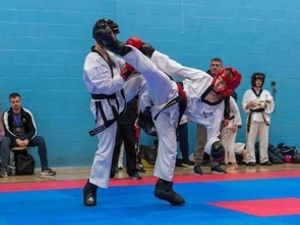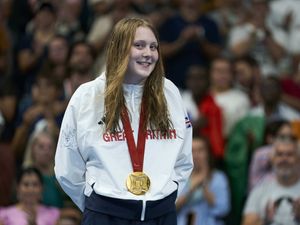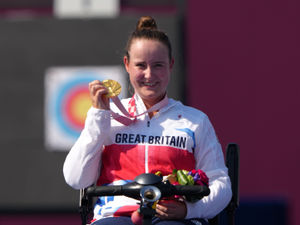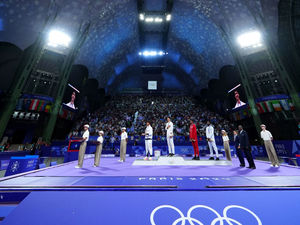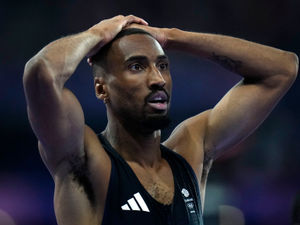Never mind Chariots of Fire, Wolverhampton's Matt Hudson-Smith’s story is Oscar-worthy
Matthew Hudson-Smith doesn’t care much for history, writing his own story is all that matters.
Over the next few days in Paris, the Wolverhampton athlete will attempt to become the first British man since Eric Liddell to win Olympic gold in the 400 metres.
They made a film about Liddell’s triumph, which took place in the same city a century ago. It’s called Chariots of Fire and won a few Oscars. There’s a decent chance you may have heard of it. Hudson-Smith hasn’t.
“I am very much a person in the present,” he chuckles, sitting down at the Team GB’s preparatory camp in St Germain-en-Laye, a short train ride to the west of Paris, a week out from competition.
“It is about focusing on the now, rather than thinking about the past and the future.”
Should Hudson-Smith cross the line first at the Stade de France in Wednesday night’s final, his own journey would be deserving of consideration from Hollywood.
It certainly has all the ingredients, from an improbable start and early success, to terrifying lows and finally, just maybe, the greatest of highs.
It is a tale about a young man working the checkouts at Brierley Hill ASDA, disillusioned with athletics, who was destined to join the Army but for a surprise call to compete at a Diamond League meet in Glasgow where he smashed his personal best to announce himself on the world stage.
The decade in between includes an Olympic debut in Rio at the age of 21 and then, three years ago, having missed out on Tokyo through injury and finding himself in debt due to a lack of medical insurance, an attempt on his own life.
Since that harrowing moment, which Hudson-Smith revealed after winning world championship bronze in Eugene 12 months later, the only way has been up. After taking silver at last year’s worlds, he has arrived in Paris as the man to beat after last month knocking three-tenths off his own European record and running under 44 seconds for the first time.
Asked about that achievement, he has a simple message: “You haven’t seen anything yet.”
“It’s not that setting those times isn’t exciting but it is not the end goal,” he explains. “That is the Olympics. I have won every single medal apart from Olympic or world gold. That is what I want.”
More than anything, Hudson-Smith’s story is about growing up. He admits to having been “naive” in the early part of his career, content to rely on raw talent and blind to what it really takes to compete for medals.
Just one example of how things have changed is his approach to gym work.
“I used to avoid it like the plague,” he says. “Even last year, from April right through to the world championships, I didn’t really do it.
“Now I do it every day at 6am, right before training. It is hard, it is not something I enjoy but the results are showing.”
“I am being the best version of myself now,” he continues. “Before I took a lot of things for granted. It was more a case of naivety, inexperience and just doing things, just because.”
Hudson-Smith now describes 2021 as a “reality check” and recalls a pivotal conversation in Starbucks with his American coach, Gary Evans.
“He said: ‘As long as you trust me and put in the hard work, you will be fine’,” he says. “I am one of those people who takes time to trust people. But I gave myself that year, jumped in with two feet.”
Christine Ohuruogu, gold medallist in women’s 400m in Beijing 16 years ago, is another key member of his team. Hudson-Smith, based in Florida since 2017, affectionately refers to her as Granny O.
“She is always in my ear,” he says. “It is all about being a better athlete and better person and understanding my role in the sport.
“I know now this sport is 10 percent physical and 90 percent mental. You have to prepare your mind to hurt and push through it.
“I was very naive, when it came to the mental aspect. I did not take diet seriously, or physio, gym and all that.
“In my head I was doing pretty good. I was always top-10 in the world. I would not say I was comfortable and happy but I was doing OK compared to others.
“When it was taken away and I lost people who were in my ear, telling me to stop being complacent, I kind of got lost. Now I have a new set-up and they are forcing me to be the best version of myself.”
Just how good can Hudson-Smith be? The next four days will tell us, starting with tomorrow evening’s opening heats. For the moment, he is not looking beyond that.
Everything has been building to now, with Hudson-Smith opting not to defend his European title earlier this summer to ensure he arrived in Paris in the best shape possible.
“We have a goal in mind, for the gold, a particular time,” he says. “We have hit off every single marker before the championships.
“I wanted to run in the 43s before the Olympics because we feel we are probably going to have to do that in the semi-final, we wanted to see how the body would react. That is the reason I missed the Europeans.
“I have to navigate the rounds. I know the rest of the world are just as hungry to get the gold.
“But if they want to win it, they are going to have to take it from me.”

